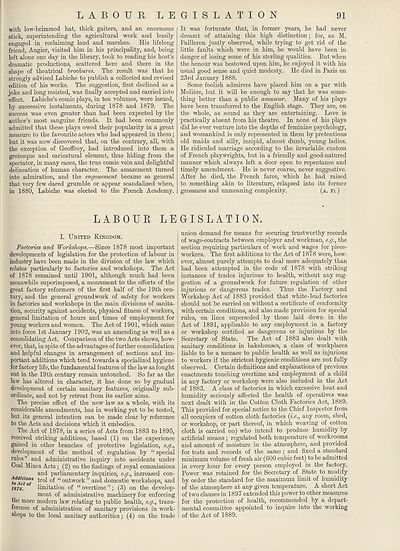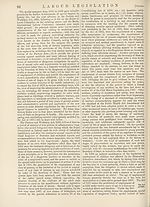New volumes of the Encyclopædia Britannica > Volume 30, K-MOR
(115) Page 91 - Labour legislation
Download files
Complete book:
Individual page:
Thumbnail gallery: Grid view | List view

91
LABOUR LEGISLATION
with low-brimmed hat, thick gaiters, and an enormous
stick, superintending the agricultural work and busily
engaged in reclaiming land and marshes. His lifelong
friend, Augier, visited him in his principality, and, being
left alone one day in the library, took to reading his host’s
dramatic productions, scattered here and there in the
shape of theatrical brochures. The result was that he
strongly advised Labiche to publish a collected and revised
edition of his works. The suggestion, first declined as a
joke and long resisted, was finally accepted and carried into
effect. Labiche’s comic plays, in ten volumes, were issued,
by successive instalments, during 1878 and 1879. The
success was even greater than had been expected by the
author’s most sanguine friends. It had been commonly
admitted that these plays owed their popularity in a great
measure to the favourite actors who had appeared in them;
but it was now discovered that, on the contrary, all, with
the exception of Geoffroy, had introduced into them a
grotesque and caricatural element, thus hiding from the
spectator, in many cases, the true comic vein and delightful
delineation of human character. The amazement turned
into admiration, and the engouement became so general
that very few dared grumble or appear scandalized when,
in 1880, Labiche was elected to the French Academy.
It was fortunate that, in former years, he had never
dreamt of attaining this high distinction; for, as M.
Pailleron justly observed, while trying to get rid of the
little faults which were in him, he would have been in
danger of losing some of his sterling qualities. But when
the honour was bestowed upon him, he enjoyed it with his
usual good sense and quiet modesty. He died in Paris on
23rd January 1888.
Some foolish admirers have placed him on a par with
Moliere, but it will be enough to say that he was some¬
thing better than a public amuseur. Many of his plays
have been transferred to the English stage. They are, on
the whole, as sound as they are entertaining. Love is
practically absent from his theatre. In none of his plays
did he ever venture into the depths of feminine psychology,
and womankind is only represented in them by pretentious
old maids and silly, insipid, almost dumb, young ladies.
He ridiculed marriage according to the invariable custom
of French playwrights, but in a friendly and good-natured
manner which always left a door open to repentance and
timely amendment. He is never coarse, never suggestive.
After he died, the French farce, which he had raised
to something akin to literature, relapsed into its former
grossness and unmeaning complexity. (a. Fi.)
LABOUR LEGISLATION.
I. United Kingdom.
Factories and Workshops.—Since 1878 most important
developments of legislation for the protection of labour in
industry have been made in the division of the law which
relates particularly to factories and workshops. The Act
of 1878 remained until 1901, although much had been
meanwhile superimposed, a monument to the efforts of the
great factory reformers of the first half of the 19th cen¬
tury, and the general groundwork of safety for workers
in factories and workshops in the main divisions of sanita¬
tion, security against accidents, physical fitness of workers,
general limitation of hours and times of employment for
young workers and women. The Act of 1901, which came
into force 1st January 1902, was an amending as well as a
consolidating Act. Comparison of the two Acts shows, how¬
ever, that, in spite of the advantages of further consolidation
and helpful changes in arrangement of sections and im¬
portant additions which tend towards a specialized hygiene
for factory life, the fundamental features of the law as fought
out in the 19th century remain untouched. So far as the
law has altered in character, it has done so by gradual
development of certain sanitary features, originally sub¬
ordinate, and not by retreat from its earlier aims.
The precise effect of the new law as a whole, with its
considerable amendments, has in working yet to be tested,
but its general intention can be made clear by reference
to the Acts and decisions which it embodies.
The Act of 1878, in a series of Acts from 1883 to 1895,
received striking additions, based (1) on the experience
gained in other branches of protective legislation, e.g.,
development of the method of regulation by “ special
rules” and administrative inquiry into accidents under
Coal Mines Acts ; (2) on the findings of royal commissions
and parliamentary inquiries, e.g., increased con-
?oAct°ofS “ outwork ” and domestic workshops, and
isrs. limitation of “ overtime ” ; (3) on the develop¬
ment of administrative machinery for enforcing
the more modern law relating to public health, e.g., trans¬
ference of administration of sanitary provisions in work¬
shops to the local sanitary authorities; (4) on the trade
union demand for means for securing trustworthy records
of wage-contracts between employer and workman, e.g., the
section requiring particulars of work and wages for piece¬
workers. The first additions to the Act of 1878 were, how¬
ever, almost purely attempts to deal more adequately than
had been attempted in the code of 1878 with striking
instances of trades injurious to health, without any sug¬
gestion of a groundwork for future regulation of other
injurious or dangerous trades. Thus the Factory and
Workshop Act of 1883 provided that white-lead factories
should not be carried on without a certificate of conformity
with certain conditions, and also made provision for special
rules, on lines superseded by those laid down in the
Act of 1891, applicable to any employment in a factory
or workshop certified as dangerous or injurious by the
Secretary of State. The Act of 1883 also dealt with
sanitary conditions in bakehouses, a class of workplaces
liable to be a menace to public health as well as injurious
to workers if the strictest hygienic conditions are not fully
observed. Certain definitions and explanations of previous
enactments touching overtime and employment of a child
in any factory or workshop were also included in the Act
of 1883. A class of factories in which excessive heat and
humidity seriously affected the health of operatives was
next dealt with in the Cotton Cloth Factories Act, 1889.
This provided for special notice to the Chief Inspector from
all occupiers of cotton cloth factories (i.e., any room, shed,
or workshop, or part thereof, in which weaving of cotton
cloth is carried on) who intend to produce humidity by
artificial means ; regulated both temperature of workrooms
and amount of moisture in the atmosphere, and provided
for tests and records of the same; and fixed a standard
minimum volume of fresh air (600 cubic feet) to be admitted
in every hour for every person employed in the factory.
Power was retained for the Secretary of State to modify
by order the standard for the maximum limit of humidity
of the atmosphere at any given temperature. A short Act
of two clauses in 1897 extended this power to other measures
for the protection of health, recommended by a depart¬
mental committee appointed to inquire into the working
of the Act of 1889.
LABOUR LEGISLATION
with low-brimmed hat, thick gaiters, and an enormous
stick, superintending the agricultural work and busily
engaged in reclaiming land and marshes. His lifelong
friend, Augier, visited him in his principality, and, being
left alone one day in the library, took to reading his host’s
dramatic productions, scattered here and there in the
shape of theatrical brochures. The result was that he
strongly advised Labiche to publish a collected and revised
edition of his works. The suggestion, first declined as a
joke and long resisted, was finally accepted and carried into
effect. Labiche’s comic plays, in ten volumes, were issued,
by successive instalments, during 1878 and 1879. The
success was even greater than had been expected by the
author’s most sanguine friends. It had been commonly
admitted that these plays owed their popularity in a great
measure to the favourite actors who had appeared in them;
but it was now discovered that, on the contrary, all, with
the exception of Geoffroy, had introduced into them a
grotesque and caricatural element, thus hiding from the
spectator, in many cases, the true comic vein and delightful
delineation of human character. The amazement turned
into admiration, and the engouement became so general
that very few dared grumble or appear scandalized when,
in 1880, Labiche was elected to the French Academy.
It was fortunate that, in former years, he had never
dreamt of attaining this high distinction; for, as M.
Pailleron justly observed, while trying to get rid of the
little faults which were in him, he would have been in
danger of losing some of his sterling qualities. But when
the honour was bestowed upon him, he enjoyed it with his
usual good sense and quiet modesty. He died in Paris on
23rd January 1888.
Some foolish admirers have placed him on a par with
Moliere, but it will be enough to say that he was some¬
thing better than a public amuseur. Many of his plays
have been transferred to the English stage. They are, on
the whole, as sound as they are entertaining. Love is
practically absent from his theatre. In none of his plays
did he ever venture into the depths of feminine psychology,
and womankind is only represented in them by pretentious
old maids and silly, insipid, almost dumb, young ladies.
He ridiculed marriage according to the invariable custom
of French playwrights, but in a friendly and good-natured
manner which always left a door open to repentance and
timely amendment. He is never coarse, never suggestive.
After he died, the French farce, which he had raised
to something akin to literature, relapsed into its former
grossness and unmeaning complexity. (a. Fi.)
LABOUR LEGISLATION.
I. United Kingdom.
Factories and Workshops.—Since 1878 most important
developments of legislation for the protection of labour in
industry have been made in the division of the law which
relates particularly to factories and workshops. The Act
of 1878 remained until 1901, although much had been
meanwhile superimposed, a monument to the efforts of the
great factory reformers of the first half of the 19th cen¬
tury, and the general groundwork of safety for workers
in factories and workshops in the main divisions of sanita¬
tion, security against accidents, physical fitness of workers,
general limitation of hours and times of employment for
young workers and women. The Act of 1901, which came
into force 1st January 1902, was an amending as well as a
consolidating Act. Comparison of the two Acts shows, how¬
ever, that, in spite of the advantages of further consolidation
and helpful changes in arrangement of sections and im¬
portant additions which tend towards a specialized hygiene
for factory life, the fundamental features of the law as fought
out in the 19th century remain untouched. So far as the
law has altered in character, it has done so by gradual
development of certain sanitary features, originally sub¬
ordinate, and not by retreat from its earlier aims.
The precise effect of the new law as a whole, with its
considerable amendments, has in working yet to be tested,
but its general intention can be made clear by reference
to the Acts and decisions which it embodies.
The Act of 1878, in a series of Acts from 1883 to 1895,
received striking additions, based (1) on the experience
gained in other branches of protective legislation, e.g.,
development of the method of regulation by “ special
rules” and administrative inquiry into accidents under
Coal Mines Acts ; (2) on the findings of royal commissions
and parliamentary inquiries, e.g., increased con-
?oAct°ofS “ outwork ” and domestic workshops, and
isrs. limitation of “ overtime ” ; (3) on the develop¬
ment of administrative machinery for enforcing
the more modern law relating to public health, e.g., trans¬
ference of administration of sanitary provisions in work¬
shops to the local sanitary authorities; (4) on the trade
union demand for means for securing trustworthy records
of wage-contracts between employer and workman, e.g., the
section requiring particulars of work and wages for piece¬
workers. The first additions to the Act of 1878 were, how¬
ever, almost purely attempts to deal more adequately than
had been attempted in the code of 1878 with striking
instances of trades injurious to health, without any sug¬
gestion of a groundwork for future regulation of other
injurious or dangerous trades. Thus the Factory and
Workshop Act of 1883 provided that white-lead factories
should not be carried on without a certificate of conformity
with certain conditions, and also made provision for special
rules, on lines superseded by those laid down in the
Act of 1891, applicable to any employment in a factory
or workshop certified as dangerous or injurious by the
Secretary of State. The Act of 1883 also dealt with
sanitary conditions in bakehouses, a class of workplaces
liable to be a menace to public health as well as injurious
to workers if the strictest hygienic conditions are not fully
observed. Certain definitions and explanations of previous
enactments touching overtime and employment of a child
in any factory or workshop were also included in the Act
of 1883. A class of factories in which excessive heat and
humidity seriously affected the health of operatives was
next dealt with in the Cotton Cloth Factories Act, 1889.
This provided for special notice to the Chief Inspector from
all occupiers of cotton cloth factories (i.e., any room, shed,
or workshop, or part thereof, in which weaving of cotton
cloth is carried on) who intend to produce humidity by
artificial means ; regulated both temperature of workrooms
and amount of moisture in the atmosphere, and provided
for tests and records of the same; and fixed a standard
minimum volume of fresh air (600 cubic feet) to be admitted
in every hour for every person employed in the factory.
Power was retained for the Secretary of State to modify
by order the standard for the maximum limit of humidity
of the atmosphere at any given temperature. A short Act
of two clauses in 1897 extended this power to other measures
for the protection of health, recommended by a depart¬
mental committee appointed to inquire into the working
of the Act of 1889.
Set display mode to:
![]() Universal Viewer |
Universal Viewer | ![]() Mirador |
Large image | Transcription
Mirador |
Large image | Transcription
Images and transcriptions on this page, including medium image downloads, may be used under the Creative Commons Attribution 4.0 International Licence unless otherwise stated. ![]()
| Encyclopaedia Britannica > New volumes of the Encyclopædia Britannica > Volume 30, K-MOR > (115) Page 91 - Labour legislation |
|---|
| Permanent URL | https://digital.nls.uk/193568996 |
|---|
| Attribution and copyright: |
|
|---|---|
| Shelfmark | EB.18 |
|---|---|
| Description | Ten editions of 'Encyclopaedia Britannica', issued from 1768-1903, in 231 volumes. Originally issued in 100 weekly parts (3 volumes) between 1768 and 1771 by publishers: Colin Macfarquhar and Andrew Bell (Edinburgh); editor: William Smellie: engraver: Andrew Bell. Expanded editions in the 19th century featured more volumes and contributions from leading experts in their fields. Managed and published in Edinburgh up to the 9th edition (25 volumes, from 1875-1889); the 10th edition (1902-1903) re-issued the 9th edition, with 11 supplementary volumes. |
|---|---|
| Additional NLS resources: |
|

